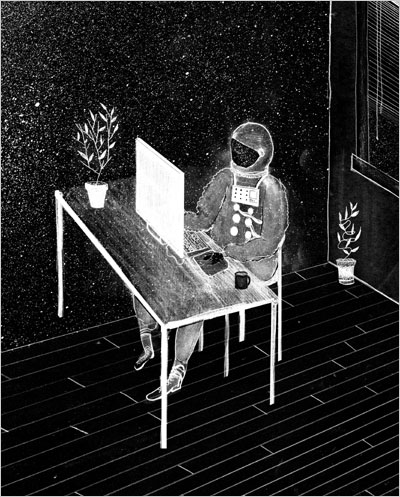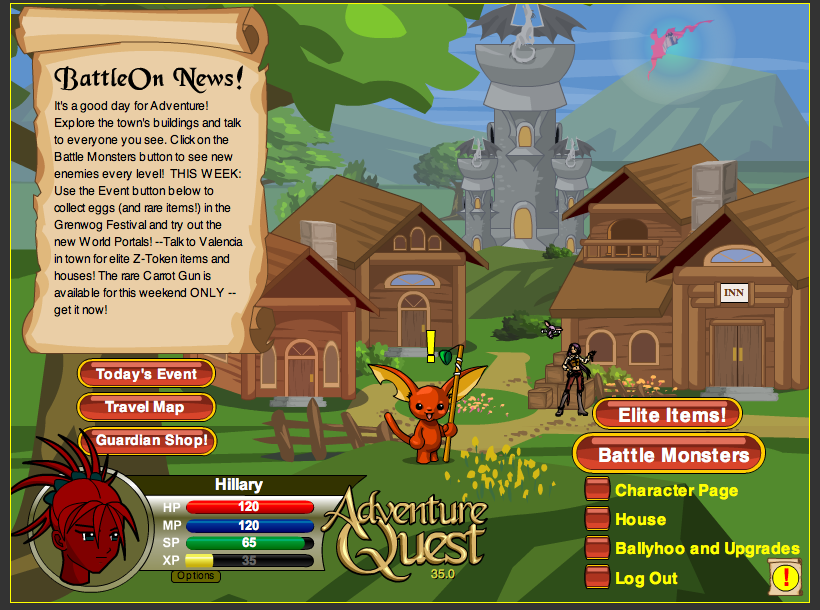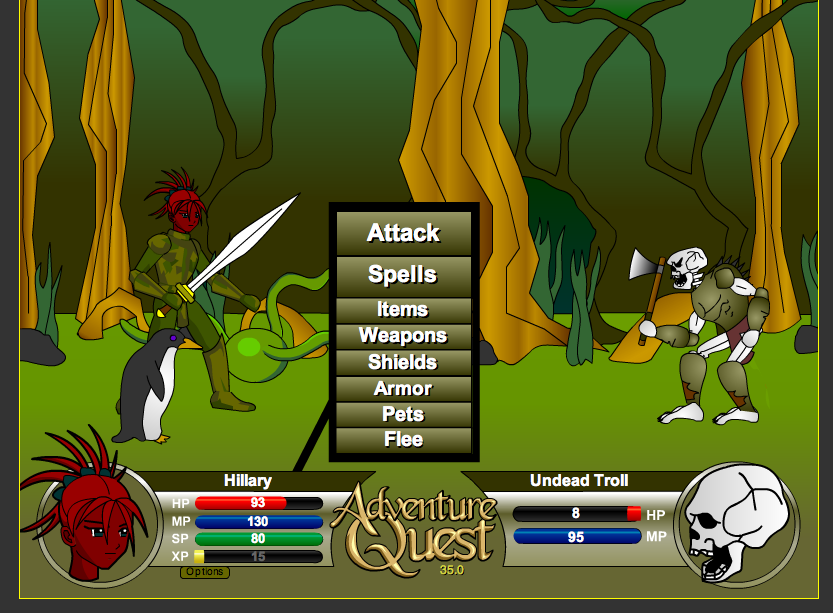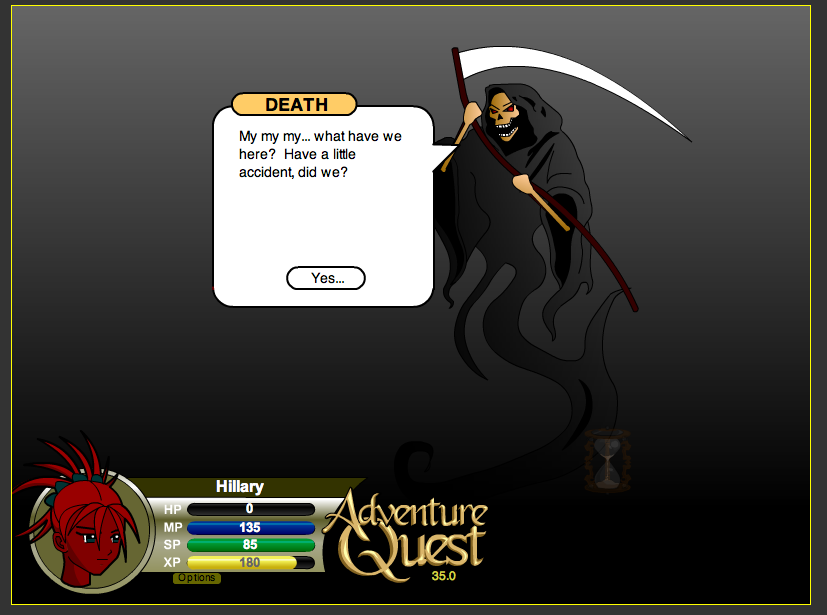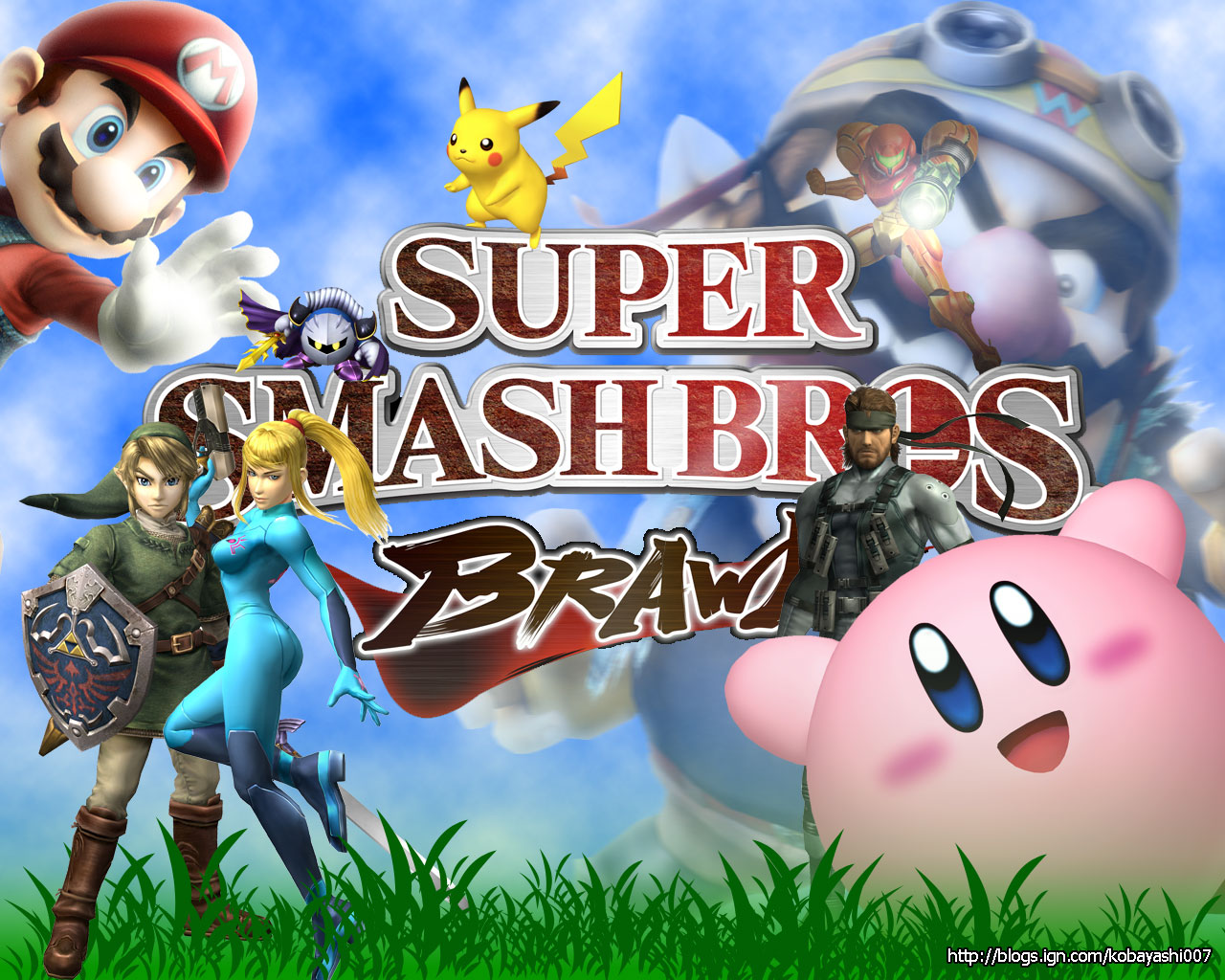Global Implications of Gaming: Gold Farming
We are comparing games to books. A fictional book is similar to a game in that it’s a fantasy and that one might identify with the main character; however, someone else argued that that’s not necessarily true, that someone might not use a book to escape or might not identify with the character. Games seemed to encourage this identification more.
Anne had trouble with the social sciences articles. The articles tended to come up with very stereotypical categories and assumptions about those categories–i.e. men vs. women, aggression vs. non-aggression.
Neither essay questioned the technologies of gender, did not seem to incorporate our complication of the whole concept of gender. We’re not really exploring different categories. Laura says: One thing to note about the social sciences is that there is a *lot* of pressure to produce quantitative research instead of qualitative research (which looks at particularities in the way that Anne likes).
We should think about causation and correlation and the difference between them. My thought–we seek for causes, but often only find correlations, and of course, social scientists are often super careful not to assume causation, although the media often does, leading to those many stories about how Facebook is awful.
Stories are great, but they are often limiting when they aren’t reflective or do not place their story within a larger context (which is what social science tends to do but misses the individuality). The first two stories for today felt like this.
Me: one thought I had about the first two She’s Such a Geek stories is that they represent the tension between the female body and a male-dominated world. Fatality!, especially, shows that when a woman gets her period, she becomes very separated from the male world.
Our life starts after work. Even play can be alienating when it’s someone else’s work. Gold farming is more than outsourcing. We may be aware of who produces our shoes, but we don’t have to come face-to-face with them. Having to face the gold farmers in game causes anxiety. The virtual world is a global village but it is divided. The world is not flat.
—-
My gaming implications: one thing I notice is that I think of gender more fluidly online. When I’m talking to people, I’m often not seeing their avatars and I’m looking at some kind of weird fantasy name that doesn’t always clearly identify gender. I hope this helps me (others?) to see gender more fluidly. Another thing I think about is the way that people across many spectrums of location, age, class (to some extent) are thrown together. For some of the younger (and often poorer) players, this is an opportunity to meet people from these different spectra that they would never have in real life. We find ourselves, I think educating each other about what it’s like to be in rural or urban America or to be a mom or a middle-schooler, etc., which I think is valuable.
And now your stories . . .
—–
Roldine talks about the way that we make the world flat through music is to export American music elsewhere. Is that more like colonialism?
Playing a game not of your culture means that you spend a lot of time disoriented.
Wii Fit displays some issues related to body image. The construction of the game itself is complicated and created in different factories in different parts of the world.
Aline talks about not knowing where her iPod is made. Is this a problem?
Nat talks about how companies use stories to hook you in.
The Doctor mentions that we can’t separate ourselves and our individual stories from global implications and we wouldn’t want to or we’ll never think about global implications.
Solomon and Rebecca discuss volunteer games vs. games for pay. Your play creates work for people not being paid for that work. Does volunteering break the magic circle?
What can we do with what we know? We can know more. What can we do? Do we stop gaming? Gaming is not different in kind from all the other consumption we do. Don’t support the people who violate the “rules” or norms. We can petition companies for change
Awhile back this semester I encountered a really interesting group who go by the name “The Protomen” (official website, MySpace). The Protomen released an album of the same name that serves as a retelling of the story of the Mega Man games. For those unfamiliar, the bare-bones story of Mega Man is set in a dystopic future ruled by an army of robots under the command of the evil Dr. Wily. Upset by the state of the world, Wily’s counterpart (and in some versions of the story, former colleague) Dr. Light builds robots to try to stop Wily. The last of these is Mega Man. Mega Man sets off to do battle with Wily’s eight Robot Masters and eventually Wily himself.
The Protomen’s retelling begins by relating the story of how Mega Man’s predecessor, Protoman, was dispatched by Light to fight Dr. Wily, but was bested in combat and killed while the hapless humans he was fighting to save looked on. Dr. Light tells this story to his new robot Mega Man – built as a son, rather than a fighter – and implores Mega Man not to go fight, saying that the humans cannot be saved by one person alone. Mega Man, outraged by Light’s pessimism and thirsty for vengeance, leaves to fight the robots. He comes at last to Wily’s second in command, revealed to be none other than Protoman. Protoman insists that the humans, who would not save themselves, are not worth saving. Mega Man, amidst a crowd imploring him to fight, kills his brother, then abandons the humans disgustedly, unwilling to fight their battle for them. As he leaves, he hears them lamenting their fate as they are torn apart by the remnants of Wily’s army.
Going along with the movie theme we seem to be following, I recently saw “Funny Games” in a screening for another class, and in our discussion of the movie, I was struck by the overlap between this movie and the video game/RL frontier that we’ve been talking about. This movie is not for the squeamish. It is INTENSE and really stressful. These two innocent-looking twenty-somethings visit the lake house of an affluent family in Austria and basically torture them and kill them off in the span of the two or so hours of the film. But this is not the interesting part. The interesting part is that the assailants constantly break the “fourth wall” and address the audience directly, saying things like, “We should torture them a bit longer, right? We’re not up to feature-length yet, and you came to be entertained.” This is terrifying. And I think it’s a clear example of what we’ve been talking about, about how the real world and the world on our computers not only get confused for one another, but sometimes actually blur into each other. In this case, the effect was chilling and uncomfortable. I know we’ll talk more about when actual money gets worked into video games later, which is also an off-putting interaction between RL/fiction, but I thought this film served as a good other-media example of this principle.
Movies – Real World vs. Virtual/ Fantasy World
Note: I had started this yesterday evening but didn’t get around to finishing it so this is along the lines of Simran’s post.
Alex’s comment on treating her life as a video game led me to think of the intersection of the real world and virtual worlds, which in turn reminded me of the 1999 movie The Thirteenth Floor that I watched. In it, a team of scientists have spent six years developing a virtual world resembling 1930s L.A. They are able to load themselves into the system and assume the identities of regular people living in the 1930s, being able to walk around, talk, experience emotions. I love the complexity of the questions the movie deals with. E.g. What happens if a simulation, that doesn’t know it’s a simulation, finds out the truth? If the people in the simulation are ‘real’ i.e. if they can think and experience emotions just like actual humans, what gives us the right to ‘play god’ by downloading into their world and messing up their lives? The BIG question – how do you know if you’re a simulation or not??
Here’s a link to the trailer on YouTube.
Another movie to mention (I always seem to find movie examples yet I don’t really watch television while at college – weird!) is Passion of Mind released in 2000 and starring Demi Moore. As Marie, a widow in France, she dreams of Marty, an executive in New York, when she sleeps. Marty also dreams of Marie when Marty goes to sleep. The line separating fantasy and reality gets blurred when she can’t tell whether she is actually Marie or Marty and the other person is only a dream. Again – how do you tell what is real and what isn’t?
Avatars: love and desire in the digital age
I stumbled upon this article in newsweek, about a couple that met playing SecondLife and is now engaged. “Lillie and Hawkins met four years ago atop a waterfall overlooking a lush green valley—the kind of magical tableau you find only in romance novels, or in sophisticated virtual universes.”
I think this speaks directly to what we talked about in class a few weeks ago, that people have different expectations from online gaming/avatar worlds– should they coincide with your real life? MUST they coincide with your real life? is this inevitable? There is a fine line between online gaming sites and online dating sites… and I personally think the two worlds should stay spearate. Lillie and Hawkins i suppose respectfully (or disrespectully) disagree.
Gold farming in and of itself is not necessarily a bad thing. It’s part of many MMORPG’s, each of which tend to have their own in-game economy. Many parts of the game require the player to spend money in order to be successful. In WoW, for example, although you can win many good pieces of equipment through gameplay, many of the really good pieces are rare and take a long time to find, so you can spend money at an auction house to purchase these items instead. To get your money, you need to sell things as well and so you farm for items, sometimes materials to make potions, armor, and other items. Generally, as long as you’re doing this within the game, you’re not doing any harm to anyone. You’re just participating in the fake economy. It’s when you purchase items outside of the game that potential harm occurs.
But gold farming is also a profession itself and some companies hire people to spend all day gaming, farming for items that they can sell for in-game gold and then sell that gold online to people who pay real cash for it. In December 2008, Wired ran a story about Brock Pierce, one of the moguls of the real money trading business where real cash (and lots of it) was exchanged for in-game items:
That Pierce lives the life of a former corporate mogul at the age of 28 is remarkable enough in itself. Even more so, perhaps, is that he got here by dominating an industry in which orcs, trolls, elves, dwarves, and minotaurs are major segments of both the customer base and the labor force. That industry is known to insiders as real-money trading, or RMT, and if I tell you now that I’ve made some money in it myself, that’s not because I expect you to take it on my say-so that there are people who might pay as much as $1,800 for an eight-piece suit of Skyshatter chain mail made entirely of fiction and code. Or that there are millions more—players of World of Warcraft, Age of Conan, EverQuest, EVE Online, and other massively multiplayer online role-playing games (MMORPGs, or MMOs)—who have given other players real money in exchange for the virtual weapons, armor, currencies, and other sought-after items around which these games revolve. Or that despite the game companies’ widespread prohibition of such transactions, their number has grown to support an estimated $2 billion annual trade, a half dozen multimillion-dollar online retail businesses, and an enormous Chinese workforce earning 30 cents an hour playing MMOs and harvesting treasure to supply the major retailers.
As this paragraph makes clear, the exchange of these items for cash is often at the expense of people who earn next to nothing in order to support a person’s over-the-top gaming habit. When you’re willing to spend real money for game items, I personally think you’ve gone over the top.
For me, there are 2 problems. One, I don’t like the idea of people gaming for 30 cents/hour so some rich kid can have a cool sword or more gold than God. But the second problem is that such practices kind of ruin the gaming experience at times. Not that many people can play enough to get every single good thing in the game, though many get lucky, so those that go outside the game to buy them end up with better stuff, which allows them to play better and accumulate even better stuff and so on. Those of us playing a normal amount of time and/or who don’t buy their stuff outside of the game have no chance of catching up. Depending on the game, this can really suck. Gaming companies are trying to keep this under control and eliminate altogether, but where there’s money to be made, it seems humans can’t help themselves.
Food for G&T thought from NY Times today
I found 4 different articles in the New York Times today that fit into what we’ve been talking about lately. Is this because the NYTimes is reading our blog or because now I see everything as having to do with gender and technology???
On the front page, “Disney Uses Science to Draw Boy Viewers” relates to what I was thinking about with Katamari Damacy and how kids get marketed to. It describes Disney’s attempt to woo back boys ages 6-14 who left for other entertainment as Disney has become more girl-focused in past years. One of the shows on their new Disney XD channel is about a kid who isn’t great at basketball but IS great at video games. My favorite part of this article was its claim that Disney hasn’t liked talking about the kind of research it’s doing into boys’ likes, dislikes, emotional states, etc. for fear that it would come off as too “manipulative.” My other favorite part was a mention of a failed digital News Corp (grrr) network, Boyz Channel and its respective Girlz channel, which drew criticism for “segregating the sexes” and “reinforcing stereotypes.” People who are trying to make money off of this age group are grappling with the same anxieties that we are in this class.
The op-ed “Boldly Going Nowhere” is a sobering explanation about how humans will probably never travel to other solar systems… EXCEPT through the transmissions of tiny robotic probes that will allow us to explore space in the same way the we can “wander through on-line environments like Second Life.” The scientist describes it as Google Earth for space. For real: I seriously cannot wait.
Then there’s this Australian performance artist who has an ear in his arm. And you can listen to what’s it’s hearing on the Internet. “The ear visualizes that idea that we can now engineer additional organs, Internet-enabled, to better function in the technological terrain that we now inhabit,” he said. “It is also an image of excess, of ambivalence and of the alternate.” Wow.
Finally, in response to George’s post, this op-ed piece by Adam Cohen, who says that a zombies are monsters for our time. Unlike George, I love Pride and Prejudice and don’t love zombies, but mashups that make us look at the canon in new ways are…worthwhile, at least? I just really don’t want to see the movie.
Wonderella the awesome : especially appropriate to our gaming
Technology is gonna end ze world! : the world’s gonna end because of technology.
Let us know here what option you’d prefer for presenting your multimedia projects. It would be great if you could rank them as well in case things are close.
Option 1: Do the presentations as a whole group, with each person getting about 3 minutes.
Option 2: Split into two groups, with each person getting about 6 minutes.
Option 3: Post the projects online and we (either Anne and myself or the class as a whole) will select several for discussion during the final week of class.
They say that if you like Joseph Heller’s Catch 22 then you will not like Jane Austen’s Pride and Prejudice. I personally have always wondered where this saying came from and if it was related to gender. Assuming the distinction between the books is gender, then I think that my friend has inadvertently given me material for a random blog.
She knows how much I dislike P&P (and how I love Catch 22) and decided to share with me her new discovery… “Seth Grahame-Smith’s zombie mash-up Pride and Prejudice and Zombies.” This actually sounds exciting to me and I almost ordered it, except for I am a poor college student so I’ll wait for it.
It has “all-new scenes of bone-crunching zombie mayhem” where Elizabeth and her sisters kick zombie ass (while Darcy sits back and watches)!
***Read all about it HERE!!!!
…in class on Monday afternoon:
(here are Laura’s notes for what she planned….)
Laura gave an overview of the requirements for the remainder of the course, and then reviewed her summary of our last conversation, emphasizing our shared sense of uncomfortable “otherworldliness” on-line, our difficulties drawing boundaries around the self, and also of devising laws to manage our on-line interactions.
We turned then to our experiences of gaming. How do virtual worlds and gaming overlap? Did we feel as uncomfortable in gaming environments as we did in virtual worlds? Stories included those of grandparents who can play games on-line they can no longer play in the real world; our own sense of being more outgoing on-line, because there are fewer ramifications; a contrasting sense of being much shyer–because the social mores are less clear, and it’s also harder to tell what others mean; a sense that everyone else knows what is going on except us–that we don’t belong, are new and feel lonely.
Are there contexts in real life where those same experiences occur, on the same spectrum from freedom to constraint? Some of us dissociate from the avatars we create; this may be similar to real life, where we may also “dissociate from our packaging” (i.e. our names may not accurately indicate who we are). People who are new to the scene generally feel more awkward; this is true both on-line and in real life. The spectrum also varies depending how comfortable we are with reality, as well as how much our avatar resembles ourselves. The rules of the game can also affect how free we feel: the structure might actually enable freedom, by offering us a place to begin.
What are the differences among games, in terms of the effects they have on our experiences? Every world has rules; they are all constraining in different ways. How comfortable are we with how the technical aspects intersect with the social norms? Some of us really need to know what the objectives are. Games have rules, while there are none in Second Life–it’s much more open-ended.
This is discussed often in the gaming industry (particularly in “sandbox games,” which permit you to tread outside the clear objectives): how much freedom is liberating? It takes a long time to figure out what we want in life; being dropped into a virtual life as a new avatar is overwhelming: you don’t know what you want. We are dealing here with a parallel universe: why bother? Why wander around creating things? Some of us actually spend a lot of time in real life pretending, visualizing our experiences as if they were games; for some of us, life @ Bryn Mawr is a “second life.” Coming to college may have been for many of us the first time we had two different real worlds to operate within.
Thinking some more about the parallels between virtual and real worlds: Games reward us for different things than life does; the virtual world may “favor” us in a way the real world doesn’t. There is also always an element of escapism. How we navigate our social interactions–being a student, a daughter, a friend–these are all avatars that we select to use in different situations. We are given these avatars; we don’t choose them.
Some of us feel more uncomfortable in virtual worlds, not knowing who we are interacting with; in real life, we can better make some passing judgment about who others are. Alternatively: in the real world, we are in danger of making snap judgments based on racial, classed or gendered stereotypes. You can’t know what you are dealing with in the virtual world–not only the people, but also the environment itself (which could damage your computer, etc.). It could be a good thing, that we can represent ourselves as someone different than we are in real life. We are also free to walk away from our attachment to our avatar, or to on-line interactions which make us uncomfortable. The vast majority of us are less invested in our avatars than in our real selves. Should we worry, if we can’t dissociate from our avatars?
It can also be extremely empowering, to create any identity we want on-line. People usually assume new identities out of curiosity, not malicious intent. It can open a whole new world of possibilities. Friendship can be real, even if the identity we assume is not. What we say can be real, even if “who we say it as” is not. We can learn to “read the text,” to decide what is true, to value what is there.
For some of us, on-line relationships can be shallower than those in real life; for others of us, our closest friends may be on-line. Why is it okay to change your identity on-line, but not off? Did we change our identity when we came to college, dropped here into a “second life,” a “bubble”? For some of us, because it’s a different environment, so we act differently; others have a clear sense of the continuity between who we were in highschool and who we are here.
Some of us feel conflicted about changing ourselves in college. Our parents may take pleasure in “watching us become who we are”; others may fear that we are losing parts of ourselves, as we emphasize new aspects of our personality.
Do virtual worlds offer a way to explore some of those changes–to craft a new identity? to delete it?–without having to try it out in the real world, where there may be more substantial consequences?
The spectra:
Freedom ——————————————————————————————- Constraint
Experienced ———————————————————————————– Inexperienced
Doesn’t Resemble Self ———————————————————————– Resembles Self
Fantasy ———————————————————————————————– Reality
Lack of Rules ——————————————————————– Unfamiliar Rules, Controls
Knowing the Objectives ——————————————————– Not Knowing the Objectives
Knowledge ——————————————————————————- Lack of Knowledge
Switching gears to talk about the article on gender in gaming:
What surprised us in the article?
- The discrepancy between reported and actual time spent gaming–> suggests that other reports (on gender identity, for example) might not be accurate?
- Older women are more often gamers than young guys. Are they empty nesters? Unhappy in their relationships?
- What about interacting on-line with those with whom we have real-life relationships? Are these ways to build on/up our relationships (for example: couples with one another, or parents with their children).
This study differs from earlier reports because it was able to compare what people reported with what they actually played; people tend not to self-report accurately. (Consider: how many hours you report spending on your classes…). The study argued that women who identified as bisexual felt freer to report their actual times, because they were used not to fitting stereotypes. But how constrained was the study by conventional understandings of gender categories? Does the practice of gaming actually put us into those binaries? (Consider reports that gay women assume male roles, in order to avoid harrassment; or heterosexual couples playing on-line as homosexual.)
Was our experience, gaming, one of being strongly gendered? In one game, all the characters look more or less the same; they are basically selling a body type. In other games, characters don’t have a physical manifestation; we are supposed to be immersed in a game as ourselves (consider Myst, requiring elaborate, painful cognitive work). In others, we can’t pick our gender–we might be gods, or paper dolls.
Some games are insistently gendered in terms of the environment created, while the characters themselves are not. You don’t have to have an avatar in order to feel gendered. How little it takes for a game to be gendered: consider a text-based game, in which women get harrassed); people are very aware of gender, even when it is only a line of text. Would more men, women or transgenders be inclined to play on-line games? What is the gender breakdown of different kinds of games? How are games gendered in terms of their marketing, or their appeal to different sorts of people?
There were many unappealing gender aspects in the games we played. If we think about gender in terms of a continuum, instead of binary “boxes,” could these game altered? A game aimed predominately @ young boys may tell them quite a bit about girls. Several of us reported on several generations of games, which had been modified over the course of time.
The study also reported that couples who played together reinforced traditional gender roles. How much do the settings of such games encourage typical interactions? What proportion of women gamers fall into this category? What do we think about this finding? Many women report being drawn into a game by boyfriend; few seem to want to admit that they came to it themselves (is this another example of inaccurate self-reporting, due to the violation of gender stereotypes?). There are guides available for young women, who might want to connect with gaming boyfriends…why is the reverse not available?
I’m not really much of a gamer. I used to play Super Mario Bros. and Galaxian / Space Invaders on a game console that you connected to your television set when I was younger (which I enjoyed to death by the way). Later on, I played computer games like A Bug’s Life and Prince of Persia but not that often – I didn’t actually get into the whole video-game thing like some of my friends did. So this weekend I tried Runescape, an MMORPG, at the suggestion of The Doctor. The avatar I created was a brown / dark woman dressed in blue and black – nothing too fancy or too off the mark from what I look like (except maybe the hairstyle). read more…
Nintendo DSi. The World Ends with You.
As some of you may or may not know, two months ago I pre-ordered the new Nintendo DSi. I have been waiting, not so patiently (just ask anyone from the track team), for it to come for what seems like an eternity. Last Tuesday it arrived. AHHHHHHHHHh. I would love to tell you that I spent all weekend enjoying my wonderful new matte blue portable game system, but sadly my excessive work load was crushing my gaming soul. That being said, I did manage to squeeze in a few *cough* hours of play-time.
So I did not play any video games this weekend because…I gave them up for Lent. But I watched my friends play. My suite has an odd relationship with video games. Between the four of us, two of us (one dude, one lady) had never really played them before coming to college, while the other two (me and another guy) had. Yet because of the curiosity of the non-gaming pair, we have about 8 different consoles between us, ranging from the Atari to the Nintendo Wii with a LOT of games for each.
I will be honest: I am not all that good. I love fighting and racing games, but I don’t really take the time to actually get good at it (RPGs are more my thing, I think). Yet I enjoy watching the suite dynamics played out through video games. Often, the guys will play while the girls watch. For some reason, the guys seem to have a lot more invested in these games than we do. They play, talk trash, get happy, get angry and it all seems to be vital to their existence. They clearly love the competition and to some extent, part of their self-esteem is somehow tied to it. When I say they get angry, they really do. When Super Smash Brothers Brawl glitches and one gains an advantage over the other, they might stop playing while an argument ensues. When one repeatedly loses, they are visibly upset. “Dudes, it’s not that serious,” is like a mantra here.
I cannot say that it is that serious though. They are great friends, but it is really off-putting to see them get so worked up. My friend and I (along with other friends-usually other girls) often play Brawl and other video games to explore. We want to see how this move is executed or what would it look like if that character was really big or if this cheat code works. When we play, it seems like the atmosphere is more relaxed and friendly. Is this because we are girls or because we are not particularly skilled? We don’t know and we don’t really wonder.
This is not to say that men thrive on competition or that women like to hold hands as they skip through Second Life. We are just the small group that I interact with everyday. The guys are definitely more relaxed when they played Gunstar Heroes for Sega and I would advise your delicate sensibilities to leave if we girls were playing NARC for PS2. We have all the guns and infinite ammunition. Civilian killing sprees are not always accidental.
Does anyone else notice a certain dynamic when playing with mixed groups or is everyone equally invested?

![Reblog this post [with Zemanta]](http://img.zemanta.com/reblog_e.png?x-id=50bae3b6-2abd-4dad-82c8-0ca3e05027d8)
